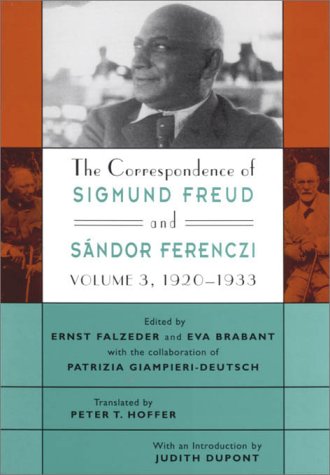The Correspondence of Sigmund Freud and Sandor Ferenczi: Volume 3: 1920-1933

Book Details
- Publisher : Harvard U.P.
- Published : 2000
- Cover : Hardback
- Pages : 528
- Category :
Psychoanalysis - Catalogue No : 8794
- ISBN 13 : 9780674002975
- ISBN 10 : 0674002970
About the Editor(s)
Ernst Falzeder, PhD, is a Senior Research Fellow at the University College London, and editor and translator for the Philemon Foundation of the publication of the Complete Works of C. G. Jung. He is a former research fellow at the University of Geneva, as well as Cornell University Medical School (NYC), and Harvard University (Cambridge, MA). He was chief editor of the Freud/Ferenczi correspondence (3 vols., Harvard University Press), editor of the complete Freud/Abraham letters (Karnac), translator of Jung’s seminar on children’s dreams (Princeton University Press), and editor, with John Beebe, as well as translator of Jung’s correspondence with Hans Schmid (Princeton University Press). He has also written more than two hundred publications on the history, theory and technique of psychoanalysis and analytical psychology.
Sándor Ferenczi (7 July 1873 – 22 May 1933) was a Hungarian psychoanalyst, a key theorist of the psychoanalytic school and a close associate of Sigmund Freud whod latter wrote that Ferenczi made “all analysts his students"", a fitting tribute to a towering figure of psychoanalysis. In 1910, at Freud’s suggestion, Ferenczi proposed the founding of the International Psychoanalytic Association, and in 1913 founded the Hungarian Psychoanalytic Society. In 1916 he underwent a brief personal analysis with Freud, and in 1918 was elected president of the International Psychoanalytic Society.
Ferenczi’s early contributions to psychoanalysis have been so fully assimilated that their origin is often forgotten, although his later writings, which were more speculative and deviated from Freudian orthodoxy, have been less widely accepted. He is acknowledged to have been a gifted therapist. He proposed a number of innovations in technique including at first these centered on the so-called “active” technique, while his later study of reactions of disappointment and mistrust that the child suffers in his relationship with his parents inspired a few of his pupils, notably Alice Balint (1949), to investigate early parent-child relationships.
More titles by Sandor Ferenczi
Sigmund Freud was born in 1856 in Moravia; from 1860 until Hitler's invasion of Austria in 1938 he lived in Vienna. He was then forced to seek asylum in London, where he died the following year. He began his career as a doctor, specialising in work on the anatomy and physiology of the nervous system. He was almost thirty when his interests first turned to psychology, and during ten years of clinical work in Vienna he developed the practice of what he called ""psychoanalysis"". This began simply as a method of treating neurotic patients by investigating their minds, but it quickly grew into an investigation of the workings of the mind in general, both ill or healthy. Freud demonstrated the normal development of the sexual instinct in childhood and, largely on the basis of an examination of dreams, arrived at his fundamental discovery of the unconscious forces that influence our everyday thoughts and actions. Freud's ideas have shaped not only many specialist disciplines, but have also influenced the entire intellectual climate of the last century.

